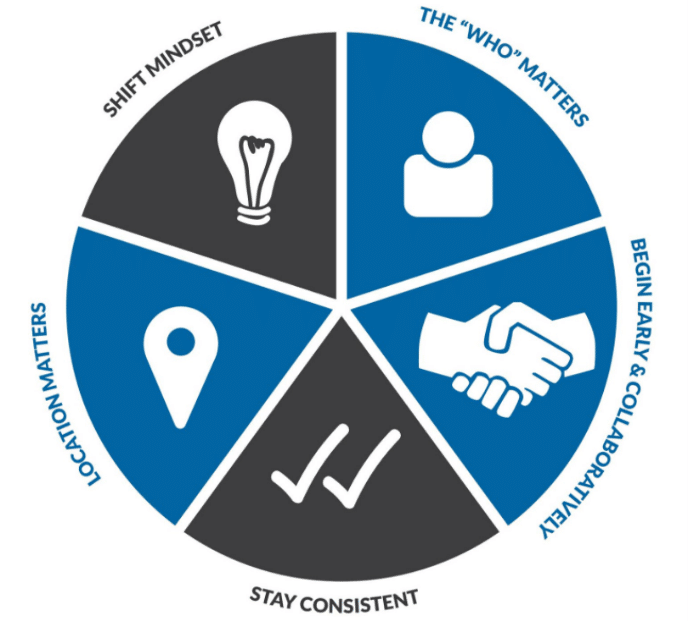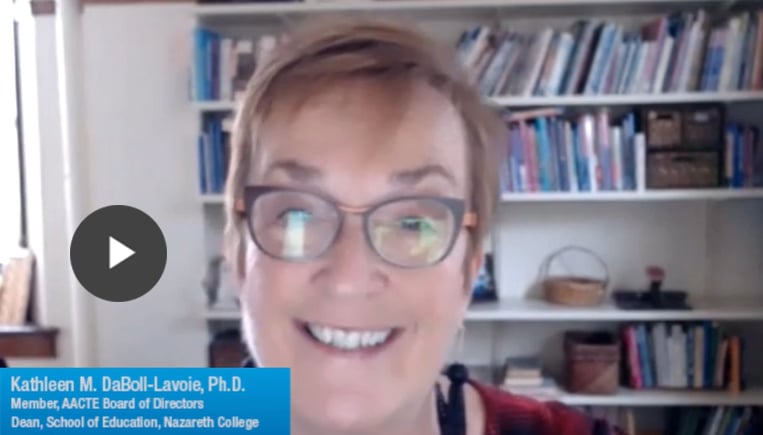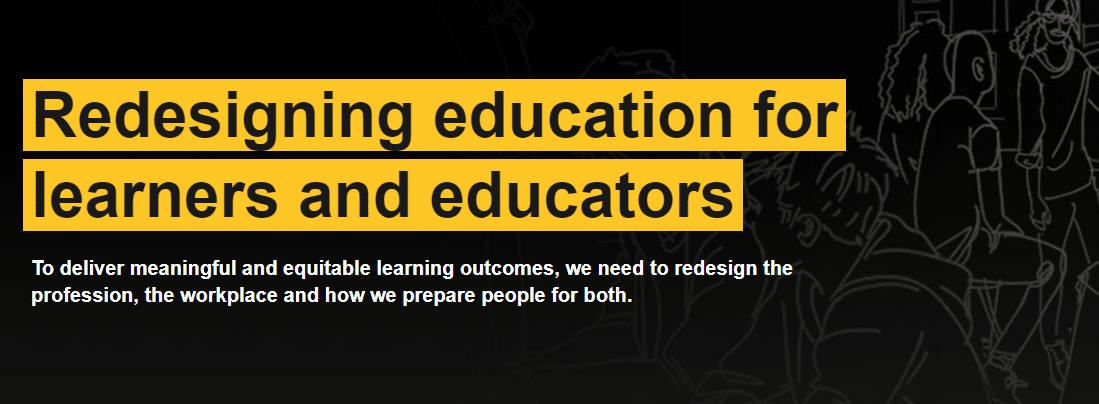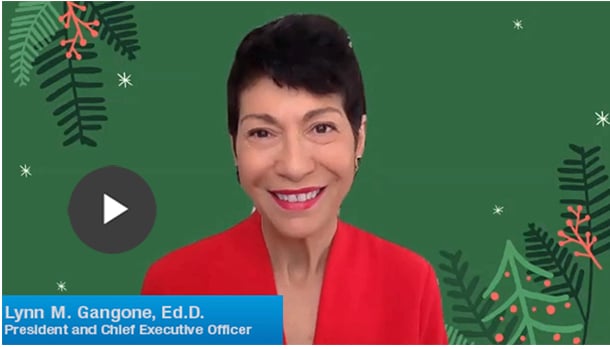05 Jan2021
By Prepared To Teach
 What are the ingredients P-12 and institutions of higher education partners need to co-design a teacher residency? Western Washington University and Ferndale School District offer some lessons about how to meet both university & P-12 needs in this new report.
What are the ingredients P-12 and institutions of higher education partners need to co-design a teacher residency? Western Washington University and Ferndale School District offer some lessons about how to meet both university & P-12 needs in this new report.
Co-Designing Teacher Residencies: Sharing leadership, finding new opportunities focuses on how a group of university teacher educators at Western Washington University’s Elementary Education program and district administrators at Ferndale School District reconsidered their approach to teacher preparation. Instead of viewing preparation as primarily the University’s responsibility, the partnership placed the needs of P-12 students and the district at the forefront of considerations, while also honoring a parallel goal of enhancing the preparation experience.
05 Jan2021
By Melissa Oliver
This article is part of a series that originally appeared on the Education First Blog and is reprinted with permission.
 Think back to when you were a student sitting in a math classroom. Did you believe you could excel at math? If you didn’t, you aren’t alone. Shequana Wright-Chung, adjunct assistant professor of early childhood mathematics education at Brooklyn College at the City University of New York, shares that it’s a common belief and one that is often impacted by racial identity and racial bias—our own internalized biases and those of our educators. In this blog, learn more about how Wright-Chung develops culturally-sensitive math educators who are mindful and aware of racial biases and how they impact students’ mathematical learning. It starts with…a story.
Think back to when you were a student sitting in a math classroom. Did you believe you could excel at math? If you didn’t, you aren’t alone. Shequana Wright-Chung, adjunct assistant professor of early childhood mathematics education at Brooklyn College at the City University of New York, shares that it’s a common belief and one that is often impacted by racial identity and racial bias—our own internalized biases and those of our educators. In this blog, learn more about how Wright-Chung develops culturally-sensitive math educators who are mindful and aware of racial biases and how they impact students’ mathematical learning. It starts with…a story.
“I always thought I was not great at math,” Shequana Wright-Chung recalls a teacher candidate sharing last semester. It’s not an uncommon belief. Thinking back to the good ole days of a weekend brunch with six of your closest friends, how many jokes would come up at the table about not being a math person when the bill arrives? The truth is, there is no Math nation with Math citizenry. Math people aren’t born, they’re developed.
So, what impact does it have on students’ ability to excel at mathematics when their teachers are math averse? How do educators’ mindsets about content and student (assumed innate) ability to learn shape academic achievement? How does an educator’s racial identity and what they’ve internalized about their racial group in relation to math dictate the expectations they develop about same-race-students’ math abilities? How does what educators believe about other racial groups’ math aptitude impact the way they teach?
05 Jan2021
By Jacqueline E. King, Ph.D. and Jane E. West

Administrators and faculty of educator preparation programs (EPPs) have long been concerned about the challenge of attracting students to a profession where college affordability and financial compensation discourages them from pursuing teaching as a career. However, due to the pandemic, the concern is growing. Our nation’s educational system is at a critical crossroad where teacher shortages and budget cuts are colliding. On one hand we have teachers who are retiring early amid health concerns or being furloughed, and on the other hand, we have EPPs with shrinking programs and enrollment. This is the perfect storm many education leaders have feared, and the impact will be acute if we do not find ways to encourage diverse and talented students to enter a career in education.
To start, we need to address the financial challenges that future educators face, including a high student loan debt to earnings ratio and lack of awareness of scholarships and loan forgiveness at the federal, state, and university levels. Recently, the American Association of Colleges for Teacher Education (AACTE) released the Issue Brief, How Do Education Students Pay for College?, based upon data from the 2015-16 National Postsecondary Student Aid Study (NPSAS). According to the data, by the time education students graduate, 76% of them have taken student loans, and the average amount they borrow is nearly $28,000.
05 Jan2021
By AACTE
AACTE has launched a new initiative to examine state-level teacher certification assessment scores, with the goal to improve equitable and inclusive practices for promoting a diverse educator workforce. The initiative, funded by the Bill & Melinda Gates Foundation, will enable AACTE to develop national guidelines and recommendations for state education leaders in establishing criteria for equitable evaluations for teacher candidates seeking state licensure.
“Left uninterrogated, standardized tests of any sort tend to spur inequalities, rather than resolve them,” said Leslie T. Fenwick, AACTE dean in residence. “If entrance exams are decimating the ranks of prospective pre-service teachers of color, we have a moral and practical obligation to correct the outsized impact of these tests on the future of our profession.”
04 Jan2021
By Linda Minor

Were you busy wrapping things up at the end of 2020 and you forgot to register for the 2021 Annual Meeting? Don’t worry. There is still time to register at the early bird rate. AACTE has extended the deadline until Monday, January 11 at midnight.
Don’t miss out on registering for the virtual conference at this discounted rate. AACTE 2021, to be held February 24-26, offers attendees three days of concurrent sessions, keynote speakers, professional service providers and other exhibitors in the Conference Community Center, as well as networking opportunities at various receptions.
Access the Online Event Planner to view and plan for the day-to-day schedule of events.

For more conference details, visit www.aacte.org, follow us on Twitter and Facebook, and join the conversation using #AACTE21.
Come experience the reimagined AACTE Annual Meeting – One community. One purpose. One voice.
04 Jan2021
By Lynn M. Gangone
 “Education is simply the soul of a society as it passes from one generation to another.”
“Education is simply the soul of a society as it passes from one generation to another.”
– G.K. Chesterton
Happy New Year!
The year 2020 was a tumultuous one for educators. The COVID-19 pandemic has brought educator preparation to a dangerous crossroad, with teachers, principals, school counselors, and other essential education professionals experiencing a debilitating spate of closures and faculty layoffs. The public education workforce lost more than 600,000 jobs last year, with university-based educator preparation programs also encountering reduced enrollment and program closures. Our members have experienced declines in undergraduate enrollment, budget cuts, and reduced staffing. Rising demand for new teachers and shrinking capacity in colleges and universities threatens the high-quality education our populace needs to ensure a rich quality of life and global competitiveness for generations. But as we begin the new year, we look toward 2021 with a renewed sense of hope and optimism for the future.
18 Dec2020
By AACTE
(December 18, 2020, Washington, D.C.) The American Association of Colleges for Teacher Education (AACTE) President and CEO Lynn M. Gangone issued the following statement today regarding the new Secretary of Education under the Biden-Harris administration:
“AACTE has happily submitted recommendations and participated in discussions with the Biden Transition Team regarding what is needed to rebuild and revolutionize education. We have highlighted the critical need for a COVID-19 relief bill, provided critical suggestions for the first 100-day executive actions, and contributed ideas for long term strategies and investments.
For the last four years, our nation has suffered from misguided and inadequate leadership at the U.S. Department of Education. This Administration’s failures have taken our nation’s PK-12 schools and system of higher education down a destructive path. While school districts struggle amidst a shortage of educators, with more than 600,000 jobs lost, so too do colleges of education with lowered program enrollment, program closures and faculty layoffs. The educator pipeline is at risk, and the future of our public education system is in jeopardy.
18 Dec2020
By Kathleen M. DaBoll-Lavoie, Ph.D.
 On behalf of the AACTE Board of Directors, I would like to thank you and your colleagues at American Association of Colleges for Teacher Education for your support of AACTE. This year has been a challenge for all of us, and I take comfort in the community of peers I have at AACTE.
On behalf of the AACTE Board of Directors, I would like to thank you and your colleagues at American Association of Colleges for Teacher Education for your support of AACTE. This year has been a challenge for all of us, and I take comfort in the community of peers I have at AACTE.
I have found the resources AACTE membership provides invaluable, especially now. Specifically, the resources below have helped me navigate the impacts of the pandemic at the state and local level:
AACTE understands the unusual circumstances of 2020 have greatly impacted you and your institution. As such, AACTE is piloting a state chapter incentive program, whereby AACTE is extending a 25% discount on 2021 national dues to state chapter member institutions. This discount is offered to both financially aid and encourage state institutions to join and retain membership at the national level. Additionally, if 75% of state chapter members renew their AACTE membership in full for 2021 (at the discounted rate), AACTE will extend the 25% discount into 2022 membership dues as well. Please contact your state chapter president or membership@aacte.org for additional information on the program.
To renew your AACTE membership:
- Submit Your Renewal via Credit Card: Visit your AACTE Profile to submit payment online.
- Submit Your Renewal via Check: Make payable to “AACTE” and mail to AACTE, PO Box 825490, Philadelphia, PA 19182-5490.
On behalf of the Board of Directors, the Advisory Council of State Representatives (ACSR), and the National Office team, thank you for your dedication to the profession during these challenging times.
If any questions arise, please do not hesitate to contact the membership team: Meghan Grenda at mgrenda@aacte.org or Gloriatine Jones at gjones@aacte.org.
Sincerely,
Kathleen M. DaBoll-Lavoie, Ph.D.
Dean, School of Education, Nazareth College
Member, AACTE Board of Directors
Chair, Advisory Council of State Representatives
17 Dec2020
By Lynn M. Gangone
The AACTE National Office Staff and I wish you peace, joy and health this holiday season, and are grateful for you being a part of the AACTE community. In this video, I reflect upon the great work we accomplished together in 2020 and look ahead to the new year.
Please take a moment to view the
video message above and discover how you can stay involved with AACTE this holiday season.
Happy Holidays from all of us at AACTE, and best wishes for peace and prosperity in 2021.
Lynn M. Gangone, Ed.D.
President and CEO
American Association of Colleges for Teacher Education
17 Dec2020
By Jerrica Thurman

AACTE has extended registration deadlines for its virtual 2021 Annual Meeting, February 24-26. Enjoy the gift of time this holiday season to secure discounted rates for the premier educator preparation conference in the nation. The early bird registration deadline is now January 11.
Reduced Registration Rates
|
|
Early Bird
(on or before
January 11, 2020)
|
Advance Registration
(on or before
February 1, 2021)
|
Late Registration
(after February 1, 2021)
|
|
Member Rate
|
$349
|
$389
|
$419
|
|
Non Member Rate
|
$489
|
$539
|
$589
|
|
Emerging Leader
|
$179
|
$179
|
$179
|
|
Student or Holmes Scholar
|
$69
|
$89
|
$109
|
17 Dec2020
By Lynn M. Gangone
 AACTE’s Strategic Plan holds forth a vision to Revolutionize education for all learners. A bold statement for sure, and our strategic priorities of diversity, equity, and inclusion; high quality preparation; and inquiry and innovation exist to move us toward our vision.
AACTE’s Strategic Plan holds forth a vision to Revolutionize education for all learners. A bold statement for sure, and our strategic priorities of diversity, equity, and inclusion; high quality preparation; and inquiry and innovation exist to move us toward our vision.
As AACTE surveys the work of its member institutions looking for revolutionary ideas and practices, I have been intrigued by the work of member institution Arizona State University’s Mary Lou Fulton Teachers College (MLFTC) and its Next Education Workforce initiative. I invite our college of education deans to join me in adding to the conversation and the work of this initiative at a virtual convening next month.
We have talked for years about declining enrollments, the perception of lack of innovation, and the myriad challenges facing teacher education and colleges of education—as well as the challenges of our K-12 partners in staffing and retaining a classroom-ready teacher workforce. What better time to consider different approaches to our collective work? MLFTC, in partnership with its local school districts, is implementing what it calls the Next Education Workforce models in its service area.
17 Dec2020
By Azaria Cunningham

Congratulations to Timara Davis, the December Holmes Scholar of the Month. Davis is a doctoral candidate in the Exceptional Education program at the University of Central Florida (UCF). Prior to studying at UCF, Davis earned her master’s in special education with an emphasis on mild to moderate disabilities from Western Carolina University. Davis is an experienced educator, having taught for more than seven years at the elementary level and in higher education.
Previously, she served as secretary on the Holmes Council and credits the program with helping her to expand her network to other scholars of color and providing ample opportunities to build professional and personal connections. Davis has also served in other leadership roles, including serving as the former president of the Association for Doctoral Students in Exceptional Education (ADSEE) in 2019.
Her research interests include teacher preparation and professional development for general education teachers in inclusive settings and the retention of teachers, with a particular focus on high needs populations. Davis’ dissertation research will focus on implementing a data-based coaching model for general education teachers in inclusive settings.
17 Dec2020
By Stefanie Dion Jones
This article originally appeared in UCONN Today and is reprinted with permission.
This fall, the American Association of Colleges for Teacher Education (AACTE) selected UConn’s Neag School of Education to join its Holmes Scholars Program, a nationwide network of higher education institutions seeking to support students from historically underrepresented communities enrolled in graduate programs across the field of education.
For current and prospective Neag School doctoral students, the Holmes Scholars Program will offer an array of benefits — including numerous opportunities for mentorship, peer support, networking, and professional development. In addition, the Neag School has pledged to cover the costs of sending each of its Holmes Scholars to the AACTE’s annual conference, as well as the two-day preconference exclusive to Holmes Scholars, for a minimum of three years.
17 Dec2020
By Alana Dunagan
While many things have changed or been put on hold over the last several months, academic goals don’t have to. Some of the biggest changes brought on by the current pandemic are the way American students are going to school and how adult learners earn their degrees.
In Texas, more than 40,000 teaching positions are still open and as more teachers retire, school administrators have more positions than applicants to fill them. With the growing need for in-person and online schooling, there is an ever-increasing demand for qualified teachers. That’s why WGU Texas is offering the special Become a Teacher Scholarship to help paraprofessionals and other aspiring teachers get started on their teaching degrees.
The Become a Teacher scholarship program assists recipients with $2,500 in scholarship funds awarded at $625 per six-month term for up to four terms and an additional $1,500 stipend during student teaching. These funds can be applied toward any of WGU’s Teachers College degree programs leading to teacher licensure.
17 Dec2020
By Ruth Campbell
This article originally appeared in Odessa American and is reprinted with permission.
University of Texas Permian Basin’s new certification program in early childhood prekindergarten through third grade education has one semester in the books.
Dean of the College of Education Larry Daniel said they have 11 to 12 students in that major.
“It’s our first semester this fall, so we’re expecting that program to continue to grow. I know we’ve had a lot of inquiries but I don’t have a precise figure. … We are expecting that program to continue to grow and having teachers certified, particularly with the early childhood area,” Daniel said during a Zoom Early Childhood Action Network meeting this week.
ECAN is a committee of the Education Partnership of the Permian Basin. The Education Partnership of the Permian Basin is a nonprofit organization focused on supporting and improving the quality of education throughout the Permian Basin from cradle to career, its website said.
 What are the ingredients P-12 and institutions of higher education partners need to co-design a teacher residency? Western Washington University and Ferndale School District offer some lessons about how to meet both university & P-12 needs in this new report.
What are the ingredients P-12 and institutions of higher education partners need to co-design a teacher residency? Western Washington University and Ferndale School District offer some lessons about how to meet both university & P-12 needs in this new report.






 Think back to when you were a student sitting in a math classroom. Did you believe you could excel at math? If you didn’t, you aren’t alone. Shequana Wright-Chung, adjunct assistant professor of early childhood mathematics education at Brooklyn College at the City University of New York, shares that it’s a common belief and one that is often impacted by racial identity and racial bias—our own internalized biases and those of our educators. In this blog, learn more about how Wright-Chung develops culturally-sensitive math educators who are mindful and aware of racial biases and how they impact students’ mathematical learning. It starts with…a story.
Think back to when you were a student sitting in a math classroom. Did you believe you could excel at math? If you didn’t, you aren’t alone. Shequana Wright-Chung, adjunct assistant professor of early childhood mathematics education at Brooklyn College at the City University of New York, shares that it’s a common belief and one that is often impacted by racial identity and racial bias—our own internalized biases and those of our educators. In this blog, learn more about how Wright-Chung develops culturally-sensitive math educators who are mindful and aware of racial biases and how they impact students’ mathematical learning. It starts with…a story. 


 “Education is simply the soul of a society as it passes from one generation to another.”
“Education is simply the soul of a society as it passes from one generation to another.”



 AACTE’s Strategic Plan holds forth a vision to Revolutionize education for all learners. A bold statement for sure, and our strategic priorities of diversity, equity, and inclusion; high quality preparation; and inquiry and innovation exist to move us toward our vision.
AACTE’s Strategic Plan holds forth a vision to Revolutionize education for all learners. A bold statement for sure, and our strategic priorities of diversity, equity, and inclusion; high quality preparation; and inquiry and innovation exist to move us toward our vision.